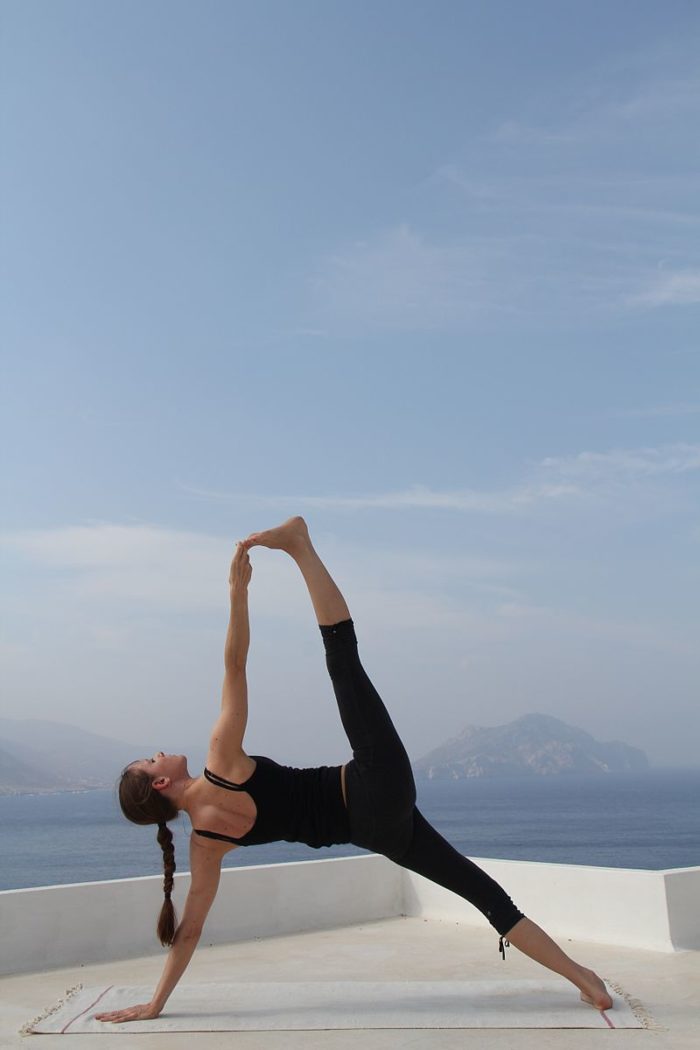For decades, yoga dabblers and devoted yogis alike have questioned the ability of yoga to give practitioners a sufficient cardiovascular challenge. Many yoga gurus have spoken out in favor of yoga’s ability to meet all of the body’s fitness needs including strength, flexibility, and cardiovascular endurance, claiming that yoga is all a person needs to stay fit.
But people remain skeptical. For many practitioners, yoga simply doesn’t make the heart pound that way that, say, running cycling, of HIIT do. I’ve felt this way for some time and have enjoyed a cross-training approach involving yoga, running, walking, stretching, ballet-barre, and energetic house cleaning (hehe). Each offers me something unique and keeps from getting bored with one exercise style.
Although this integrated method feels most natural to me, I’m still very curious about yoga and cardio. Is yoga really the whole fitness package?

Of course, the answer to this question is complicated by the fact that there are several different styles of yoga, each possibly offering different levels of cardiovascular conditioning. A respected 1989 Duke University study examined the oxygen consumption of participants practicing general yoga and those practicing an aerobics routine. While the aerobics group raised their peak oxygen consumption by 12%, the yoga group showed no increase. Although this sounds like a major bummer, keep in mind that yoga at the time of the study was less likely to incorporate more vigorous series of poses.
As popular yoga evolved, sun salutations, arguably the most heat-building series of asanas in yoga, became more common in yoga classes. Today, your average yogi off the street would probably consider sun salutations a staple of the physical practice of yoga—and this has important implications for the cardio-ness of yoga.
A 2007 study found that yoga including sun salutations increased the heart rates of participants by an average of 20% when compared to the heart rates of those practicing conventional Hatha yoga. Although these results certainly lean more in favor of yoga providing cardiovascular conditioning, the question but is it enough? remained.
Although other studies questioning yoga’s fit ability were published around the same time (some boasting yoga’s ability to do it all in terms of physical fitness), the study on yoga and cardio most respected by the scientific community took place in New York and examined a thoroughly rigorous, sun-salutation-laden, hour-long yoga practice using the most cutting-edge technology of the time. The study found that while sun salutations offered more to sedentary folks than a slow walk on a treadmill, these asanas offered little cardiovascular conditioning to experienced yogis. Ultimately, the researchers concluded, yoga did not meet the minimum aerobic recommendations established by the world’s health bodies.
The study offered some positive findings, however. Practitioners of yoga may enjoy a wide range of physical and mental health benefits including those related to blood pressure, bone health, stress, and depression. Yoga, the researchers explain, “may convey its primary benefits in ways unrelated to metabolic expenditure and increased heart rate.”
William Broad, author of The Science of Yoga, notes that this thorough study mostly settled the question of yoga and cardio for the scientific community. But it may have come too late. The marketing ploy that yoga is all you need is entrenched in the contemporary yoga “brand.” Because yoga makes us feel so great, the concept is certainly easy to believe. Couple that with professional yogis who practice hours a day and for whom yoga may actually be enough, and you’ve got an unshakeable belief swirling around the yoga studios.
I don’t want to lay blame on the yoga community, however. Each style of fitness has its limitations, and there are abundant misconceptions about fitness in general. At the end of the day, the style of fitness you choose should be about what makes you feel best—it should be an intuitive choice. Despite all of the reading I’ve done about the studies on the benefits of yoga, I don’t believe that extra knowledge has ultimately enhanced my yoga experience. It was already great, and it’s something I organically crave. The same is true of running—even though I’ve read very little about its benefits and risks! I’m simply pulled towards it as I am to yoga.
What are you favorite ways to get in a good cardio practice? Do you feel that yoga meets all of your fitness requirements?
More in Peaceful Practice: Does Yoga Breathing Oxygenate the Body?
Using Mala Beads in Your Yoga Practice
Get more like this—Subscribe to our daily inspirational newsletter for exclusive content!
Photo: Wikimedia Commons




